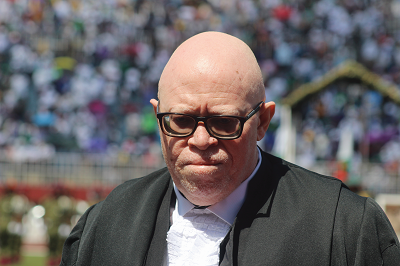By Thoboloko Nts’onyane
MASERU – President of the Court of Appeal,
Prof Kananelo Mosito, has taken a stand against the harassment faced by judges, emphasizing the importance of informed criticism from the public.
This he said last week Friday while reading the judgments in the Appeal Court.
He suggested that complaints regarding judicial conduct be lodged through the appropriate channels, with the Judicial Service Commission (JSC) responsible for addressing grievances against the judiciary and presiding officers.
Prof Mosito remarked that the courts have been under fire from the criticism made by the members of the public and organizations in an attempt to “influence them to go in a particular direction”.
“Our courts have to function without any interference by either organ of state, legislature and executive,” he said.
The presiding officers enjoy a certain level of immunity when carrying out their functions.
There have been reports of judges arriving late to court and causing delays in issuing judgments. These delays impose additional burdens on litigants who are forced to bear the costs resulting from the delays, despite having no involvement or control over them.
Earlier this year, Chief Justice Sakoane Sakoane introduced a 90-day rule, which mandates that judgments should be delivered within 90 days once a case is complete. This measure aims to expedite the judicial process and ensure timely resolution of cases.
He cautioned against what he referred to as “unjustifiable attacks” on the judiciary which some he said are directed to judges individually.
Prof Mosito said the judiciary should be criticized where necessary adding that the critics should have necessary knowledge in doing so. This practice he said is sanctioned within the democratic dispensation.
He took a swipe at the members of the legal fraternity who criticizes the judiciary and judges without following due processes. “But the situation becomes unpalatable where members of the legal fraternity attack judges and courts. We should be exemplary as lawyers.”
The President of the Court of Appeal, also known as the Court of Record, said he will endeavor to promote competence and quality service in order to cultivate public confidence in the courts.
Prof Mosito added: “The Judiciary is the last line of defense in the protection of fundamental human rights”.
He highlighted that unlike in other subordinate courts, the apex court does not have the backlog of cases.
As judges, he said they take note of the political events saying they are part of the society. He said despite seeing the political developments unfolding in the country, they “do not act” unless triggered through the judicial processes.
The President had directed the Director of Public Prosecutions (DPP), the police and the office of the Attorney General to devise a plan on expediting the speedy resolution of the criminal matters to resolve. When cases are heard and dispensed of speedily, he said the members of the public will have confidence in the courts.
“Please let’s try to protect the human race, not only professionally but also emotionally,” he appealed.


